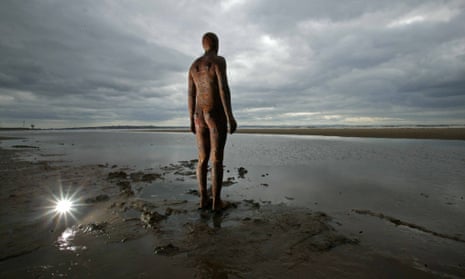Protesters have been accused of “trans hatred” after pasting phallus-shaped stickers on the genitalia of Antony Gormley’s statues on Crosby beach, saying “women don’t have penises”.
Liverpool ReSisters, a small women’s rights group which argues against the right to “self-identify” as a woman, posted a picture on Twitter showing a sticker on one of the 100 statues on Crosby beach which make up Gormley’s Another Place installation.
The group said the stickers were aimed at raising awareness of “the potential threat to sex-based rights and women’s rights” from proposed changes to the Gender Recognition Act.
Joe Anderson, Liverpool’s mayor, vowed to remove the stickers and “work with the police to identify those responsible”. He tweeted: “Liverpool takes #PRIDE in its diversity and history of fighting for equality for all, we love all our Trans residents and all our LGBT community.”
Merseyside police said they were aware of the stickers and were making inquiries to see if a crime had been committed.
The stickers were condemned by a coalition of women’s groups including Big Love Sista, the Homeless Period Project, Grrrl Power Liverpool and the Liverpool Queer Collective. In an open statement addressed to “our trans siblings”, the groups said: “In our city there’s no room for hate against trans people. We condemn the behaviour, hate and transphobia of ‘Liverpool Re-sisters.’ We condemn their appalling stickers and we absolutely will not tolerate transphobia in our city.”
The government is consulting on how to make it easier for transgender people to achieve legal recognition, potentially allowing self identification without a medical diagnosis. Currently, in order to be legally recognised as a trans woman, they must provide two medical reports, one evidencing a diagnosis of gender dysphoria and the other outlining details of any treatment received.
The stickers first caused controversy in London this month when they were stuck around the city, including outside the offices of the LGBT advocacy group Stonewall, as well as the Guardian.
Sarah Brown, a member of Stonewall’s Trans Advisory Group and a trans woman, told PinkNews: “These stickers are puerile and disgusting. There is a strong push to demonise trans women in the UK and I really worry where it’s going.”
On Saturday the ReSister Twitter account posted a picture from Crosby beach with the hashtags #StickerWoman, #NoToSelfID and #sexmatters.
The group declined to talk to the Guardian, pointing instead to its press release, which said: “Women don’t have penises. This is not hate speech, it is not transphobia, it is a simple statement of biological fact …
“Our stickers are aimed at raising awareness of the potential threat to sex-based rights and women’s rights from the proposed changes. Women and girls need spaces of their own for a variety of reasons, but principally because we continue to face male violence and harassment in public and in private spaces.”
Another Place consists of 100 cast-iron, life-size figures spread out along 3km of the foreshore, stretching almost 1km out to sea. Based on Gormley himself, the figures, each weighing 650kg, stare out at the horizon in silent expectation.
